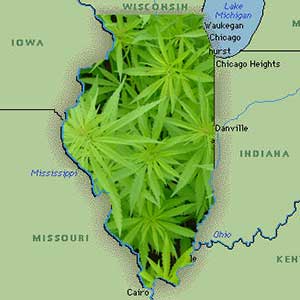 Governor Pat Quinn finally got around to signing the medical marijuana bill for the state of Illinois, making it the twentieth state to provide some measure of protection to seriously ill people who choose to use cannabis.
Governor Pat Quinn finally got around to signing the medical marijuana bill for the state of Illinois, making it the twentieth state to provide some measure of protection to seriously ill people who choose to use cannabis.
Well, some people who are seriously ill. While the standard cancer, HIV/AIDS, and glaucoma conditions are covered in Illinois as in almost every other medical marijuana state (Vermont doesn’t cover glaucoma), you’re not going to find the catch-all “severe pain” or “severe nausea” in the Illinois law. If you’re a patient in pain, it had better be “Complex Regional Pain Syndromes Type I” or “Complex Regional Pain Syndromes Type II” – no mere migraines or chronic back pain are going to qualify. Simply protecting “spastic disorders” won’t happen – you’d better specifically have “Multiple Sclerosis”, “Parkinson’s”, or “Tourette’s”. If you have found that cannabis alleviates your “seizure disorder”, I guess you’re out of luck, since none of them, including “epilepsy”, appear to be on the list. And if your illness is mental, such as a returning soldier or rape victim (unfortunately too redundant) with post-traumatic stress disorder, your use of cannabis still earns you an arrest and a jail cell in Illinois.
Why all the restrictions? To prevent healthy people from using cannabis. Folks with migraines, chronic pain, epilepsy, PTSD and such must risk imprisonment for using medical marijuana because in other medical marijuana states, there are too many patients using medical marijuana. Only with cannabis do we consider the number of patients achieving positive results with a drug treatment to be a total in need of limiting – nobody ever stops to ask whether 26 million Americans using Lipitor is too many.
See, in California, where medical marijuana started, a doctor can recommend medical marijuana to a patient for “any other illness for which marijuana provides relief.“ Imagine – doctors freed to make medical decisions considering only their patient! But that led to sign-twirling bikini girls hawking medical marijuana recommendations on Venice Beach for healthy young skateboarders with “anxiety”, so the next states came up with a list of conditions that were eligible for medical cannabis treatment, taking the discretion away from doctors and codifying it into law. Only with cannabis are doctors mandated to use a medicine only for specific conditions - one out of five prescriptions written today is for so-called off-label use, which is when a doctor gives you a drug for your condition that is FDA approved for a different conditon. (For example, beta blockers approved for high blood pressure being prescribed to alleviate migraine.)
Yet still, some healthy people managed to get their hands on medical marijuana, or so the naysayers believed. In Oregon, law enforcement railed against the ever-rising total of registered patients – 10,000, 20,000, 40,000 – and at each reporting of statistics they would claim the thousands registered must be indicative of “abuse” of medical marijuana. Why, look at all the people registered for chronic pain! Never mind the fact that 26% of Americans report chronic pain that had lasted longer than 24 hours and 42% of them say that’s been the case for longer than a year.
So the latest medical marijuana states, Illinois being the exemplar, have whittled down and redefined their qualifying condition lists to make sure patients can’t get a card with some vaguely-defined syndrome. However, that’s not the only way in which Illinois has the strictest medical marijuana law. Illinois is now the ninth medical marijuana state in a row to forbid a patient from cultivating his or her own cannabis plants.
This, too, stems from what are perceived to be “abuses” in Western medical marijuana states. California famously allows doctors to recommend any number of plants and any amount of possessed cannabis their patient requires, though six plants and eight ounces is considered to be the “floor” below which cannabis is presumed to be for medical use. Oregon and Washington allow possession of a pound and a half and over a dozen plants. Colorado allows for industrial-sized cultivation for its dispensaries. From all of these states law enforcement claims growers divert plentiful, cheap western medical marijuana to recreational marijuana consumers back east. So since Arizona in 2010, medical marijuana laws that have passed maintain all production and distribution of medical marijuana in a tightly controlled, heavily surveilled dispensary system, where by taxation, rule, and market forces the prices of medical cannabis equal the prices on the local streets.
The third way in which medical marijuana laws like Illinois’ are further restricting access is through the requirement of “bona fide” relationship with the doctor. This may sound obvious to the average person – of course you have to have a physician / patient relationship! – until you understand how medical cannabis works in the real world.
People who want to use medical cannabis fall into two camps: those who’ve been using it already and those who haven’t. For the current users, they have often been using cannabis in lieu of seeing a physician. But when they go to “get legal”, they cannot without the signature of a doctor and, in most states, a pile of medical records documenting their qualifying condition. So some of them go to a “regular” doctor to get examinations to prove they have the condition they’ve been using marijuana to treat. Under some of these newest medical marijuana laws, however, a doctor/patient relationship isn’t “bona fide” without fulfilling certain length-of-time requirements.
For the non-users, many of them have been seeing a “regular” doctor for some time, so fulfilling the “bona fide” requirement isn’t the problem, their “regular” doctor is. Most physicians who’d like to recommend medical cannabis are prevented from doing so, by their insurance, their contract with a hospital or the government, their clinic’s policies, or merely the personal fear of being labeled a “pot doc”. So in many medical marijuana states, patients gather their medical records from their “regular” doctor and take them to a specialty medical marijuana clinic where a “pot doc” will confirm the qualifying condition and sign the recommendation. That most certainly is not a “bona fide” doctor/patient relationship under the newest medical marijuana laws, like Illinois’.
Meanwhile, in Latin America, the lower house in Uruguay’s government just voted to legalize not just marijuana possession, but cultivation, selling, and buying marijuana. For healthy people! The upper house has more than enough support to pass it and the president has vowed to sign legalization into law, despite the fact that a supermajority of Uruguay’s citizens do not support marijuana legalization.
Throughout Latin America, many countries have decriminalized not just the personal possession of marijuana, but of all drugs. In Mexico, the legislature approved a law allowing possession of 5 grams of marijuana; in Paraguay it is 10 grams and in Venezuela it is 20 grams. Argentina’s Supreme Court and Ecuador’s new Constitution recognize the rights of citizens to use personal amounts of drugs.
In researching Latin America what I didn’t find was “medical marijuana”. These countries don’t make exceptions to criminal prosecution for marijuana based on specific medical conditions; they simply refuse to prosecute their citizens for being “addicts”. The reason why a citizen uses marijuana is irrelevant so long as it is a personal amount and they aren’t dealing.
In America, we have strong majorities that support general medical use of cannabis and tiny majorities that favor outright marijuana legalization, yet our bravest lawmakers have to fight for increasingly restrictive medical bills. In Latin America, they don’t even consider medical cannabis and have strong majorities that oppose outright legalization, yet their bravest lawmakers are passing decriminalization of all drugs and legalization of marijuana for all citizens because it is the right public policy.
Source: National Cannabis Coalition – make a donation






